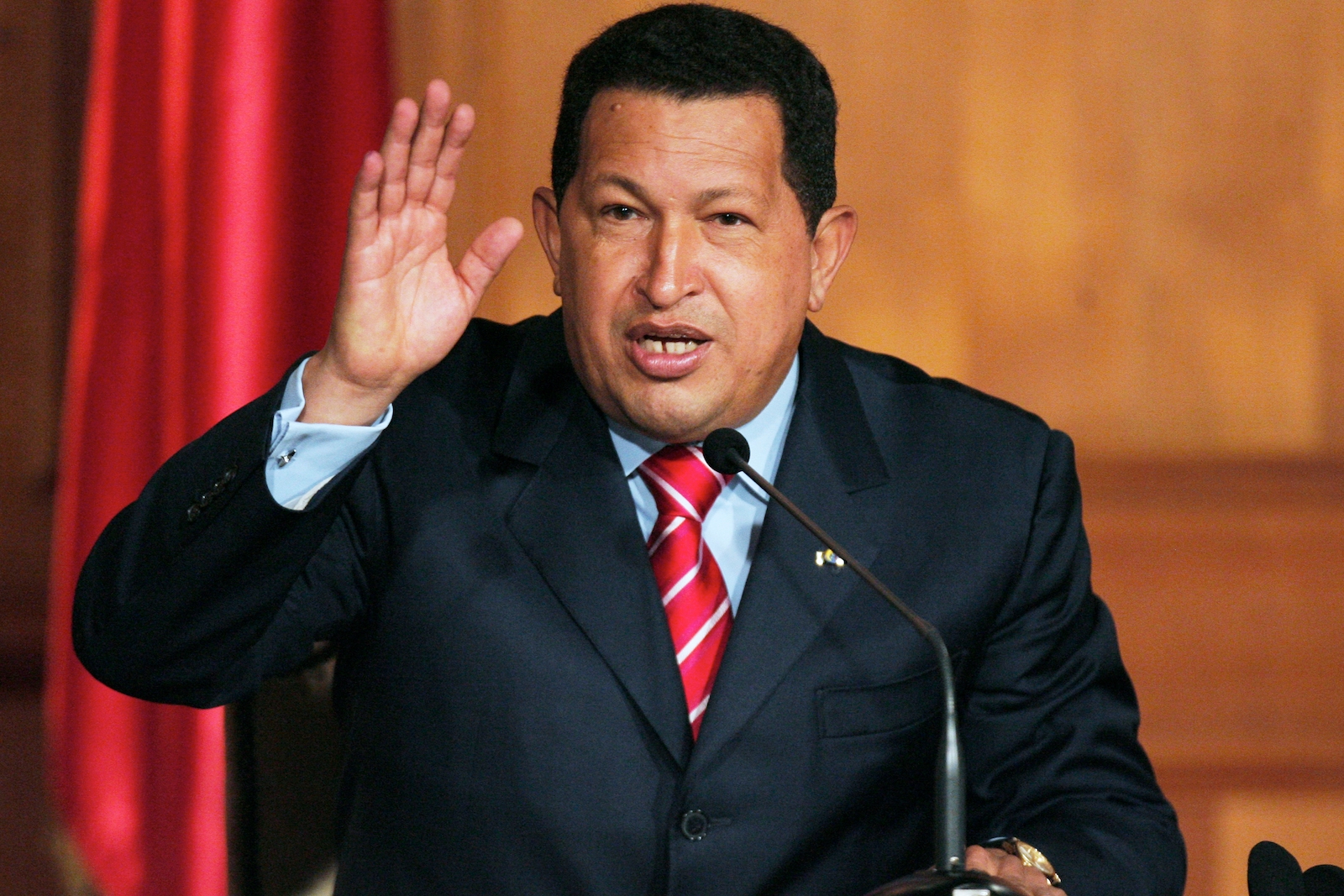
Hugo Chavez’s Legacy is Alive and Well
Many say that one cannot understand Colombia without understanding its neighbor Venezuela. While policymakers have tossed Venezuela aside as a lost cause, there are key United States (U.S.) security interests that lie in the region and that have an impact on one of the U.S.’s longest and maybe only Latin American allies, Colombia. In order to understand the security implications of the region, the U.S. security apparatus must look back in history to adequately recognize the security threats that Venezuela poses in the wider region in the 21st century.
The recent elections in Colombia revealed the deep schism between voters about how to deal with the historic social inequality and violence that have divided the country for more than half a century. At the same time, Colombia’s antagonistic neighbor, Venezuela, held controversial elections that allowed for corruption and dictatorship to continue to reign over the country as political opponents were blocked from running and thousands of migrants fled from horrendous economic conditions.
In the 21st century, one of the most pressing threats facing the U.S. is the link between corrupt states, and their profiteering from criminal activity, insurgency, and terrorism. Also, corrupt states use their alliances with criminals, insurgents, and terrorists to ensure their own security needs and weaken their opponents. This link has been in other conflicts such as Pakistan supporting the Afghan Taliban and Ethiopia supporting the South Sudanese during the 1960s and 1970s. The connection between sovereign states, criminals, insurgents, and terrorists is an alliance of convenience that allows non-state actors to financially sustain themselves, while individuals within the government of the state actor benefit financially from illicit funds.
Someone who masterfully knew how to form this alliance of convenience with criminals, insurgents, and terrorists was the late Hugo Chavez. Under Chavez and later the Maduro administration, Venezuela strategically partnered with non-state actors like the Revolutionary Armed Forces of Colombia (FARC) to fundamentally weaken the security of Colombia while enriching loyalists to the Bolivarian Revolution. Despite the recent peace agreement with the FARC, many diplomats fail to acknowledge that a vacuum has emerged for criminals and other insurgent groups to take the FARC’s place in the lucrative drug market. Unfortunately, the international community has become so focused on the peace process in Colombia that the criminal state of Venezuela has been able to continue its illicit partnerships under the newly “elected” Maduro administration.
Security specialists in the United States underplay the threat that Venezuela poses to U.S. security, which is leading to consequences such as the continued flow of drugs to the U.S. and the expansion and emergence of stronger criminal and terrorist networks within the region. To fully understand the complexity of the problem and the rise of the criminal state close to the United States, security specialists must understand the legacy that the dynamic, anti-American Hugo Chavez left in Venezuela and the rest of the Western hemisphere.
Hugo Chavez and his FARC friends
Hugo Chavez created a governmental system where criminals and terrorists seeped into the most powerful offices in Venezuela’s government. He constantly appointed and fired ministers who challenged his authority, which created job instability and a mentality to steal as much as one can before being fired. Chavez also radically changed the relationship with the military by using them to enforce his will as a tool of the socialist revolution. Nevertheless, with vast amounts of oil wealth, no oversight, and a major drug trafficking route to Europe, Venezuela became ripe for criminal groups to move in, especially with a president who was willing to work with them in order to please the political elite and stay in power for life.
Chavez sympathized with the FARC’s socialist ideology at the beginning of his presidency, especially when the group was at its peak. The newly elected president hoped that his support of the FARC would eventually destabilize the Colombian security apparatus and allow the FARC to rise to power. The case of the FARC and Venezuela demonstrates that policymakers must remember that there is a strong connection between transnational criminal networks and weak states. They also must note that the connection between both parties is mutually reinforcing, and the only way to attack the issue is by breaking down the connection on both sides.
Historical connections
The development of the relationship between Chavez’s government and the FARC can be seen by events throughout and after his presidency. In 1999, Hugo Chavez came to power and called for a Constituent Assembly to rewrite the constitution. The Constituent Assembly was a key turning point in Venezuela’s history because it concentrated power in Chavez’s hands, diminished any institutional oversight, and allowed for loyalists to enrich themselves. As democratic institutions broke down, Venezuela became a more attractive target for drug traffickers to use the country as a transit route to Europe and the United States.
Like many dictators, Chavez sought to exercise control over all components of the Venezuelan government while undermining the opposition. Modifying the constitution institutionalized a mafia-like state as it stifled all forms of political discourse and independent oversight of state institutions, allowing corruption to take root. This pattern has perpetuated under the Maduro administration, where he has used the Constituent Assembly as a tool to silence the opposition.
In 2002, a coup attempt by rebel military officers was a key turning point in the relationship between Chavez and the FARC. At the same time, the peace talks in Colombia broke down when President Pastrana ordered the military to retake the demilitarized zone controlled by the FARC. The chaos created the perfect situation for an alliance of convenience, where the FARC would ask for protection by Chavez in the free movement of money and drugs to the coastal areas of Venezuela.
The breakdown of peace agreements and the surge in funding for counterinsurgency programs through Plan Colombia caused the FARC to seek partners that were outside of their home territory. The FARC’s operations would not have been successful without their “silent partners,” the sponsoring states. As the FARC increased their role in the drug trade, they gained more resources to entice corrupt officials, allowing them to operate and hide in their territory, thus sustaining the mutually beneficial relationship.
The next turning point was in 2005 when Hugo Chavez severed his relationship with the Drug Enforcement Administration (DEA) for spying. Following the expulsion of the DEA, drug seizures dropped significantly in Venezuela and by 2008 a third of cocaine produced in Colombia was being sent through Venezuela. In the same year, Colombian forces found flash drives and computers with emails between FARC leaders and Chavez’s government in a FARC camp in Ecuador, providing proof to the international community that Chavez’s government was supporting the FARC.
By 2010, the World Drug Report found that fifty-one percent of trafficking shipments of cocaine by sea in the U.S. came from Venezuela. In 2011, Colombia presented information at the Organization of American States (OAS) that they had the grid coordinates of FARC camps and proof that five top FARC leaders were being sheltered in Venezuela. Clearly, due to the large amount of power that Hugo Chavez amassed through his Constituent Assembly and increased control over the military, any FARC operations in Venezuela would need his approval to proceed.
Chavez’s policies have had a considerable impact on the policies of his successors. For example, the current Vice President of Venezuela, Tareck El Aissami, was accused by the U.S. Treasury Department of narcotics trafficking in 2017. In the same year, Nicolas Maduro’s nephews were indicted in New York for trying to traffic cocaine into the U.S. that they obtained from the FARC. Finally, one of the clearest examples of abuse of power is when Hugo Chavez’s thirty-five-year-old daughter, Maria Gabriela Chavez, who is a permanent representative to the United Nations thus giving her diplomatic immunity, was discovered to be the richest woman in Venezuela with a fortune amounting to $4.2 billion that she claims was obtained through selling hand creams. Clearly, the institutionalization of corruption and crime carried over to the next generation of leaders after Chavez’s death.
Security impacts today
The alliance between the FARC and the government of Venezuela demonstrates how a narco-state was created in the Western Hemisphere. To this day, Venezuela continues to hide its actions from the rest of the international community by arguing sovereignty. By arguing sovereignty, Venezuela has been able to keep the international community from seeing the interworking of their government thus diminishing international accountability. Nevertheless, in order to understand the full nature of corruption, crime, and terrorism in Venezuela the U.S. must understand the man that made the modern system.
The case of Venezuela poses a threat that is close but often ignored. The U.S. must continue to put pressure on the Maduro administration and encourage other regional powers to continue to pressure Venezuela to comply with international norms. If the Trump administration continues to ignore the threat, the U.S. will welcome more criminals and terrorists into the region with little or no oversight from the international community. The U.S. needs to finally prioritize Latin America and take the time to build the relationships that are vital for long-term cooperation and security relationships. Also, the U.S. must stop using the Monroe Doctrine as a model for foreign policy because many times we impose our own vision of democracy on countries that are in need of support rather than parenting. Hugo Chavez’s legacy will continue to live until the U.S. security apparatus allocates the resources to stop criminals and terrorists from thriving in the Western Hemisphere.
